Understanding the Effectiveness of Outpatient versus Inpatient Care
In recent years, outpatient treatment has gained recognition as a viable, and often equally effective, alternative to inpatient care for managing mental health conditions and substance use disorders. This shift is supported by extensive research highlighting comparable outcomes between the two approaches, given appropriate patient selection and treatment planning. This article explores the evidence, benefits, and considerations surrounding outpatient treatment, emphasizing why it can be just as impactful as inpatient programs.
Defining inpatient and outpatient care: structural differences and clinical implications
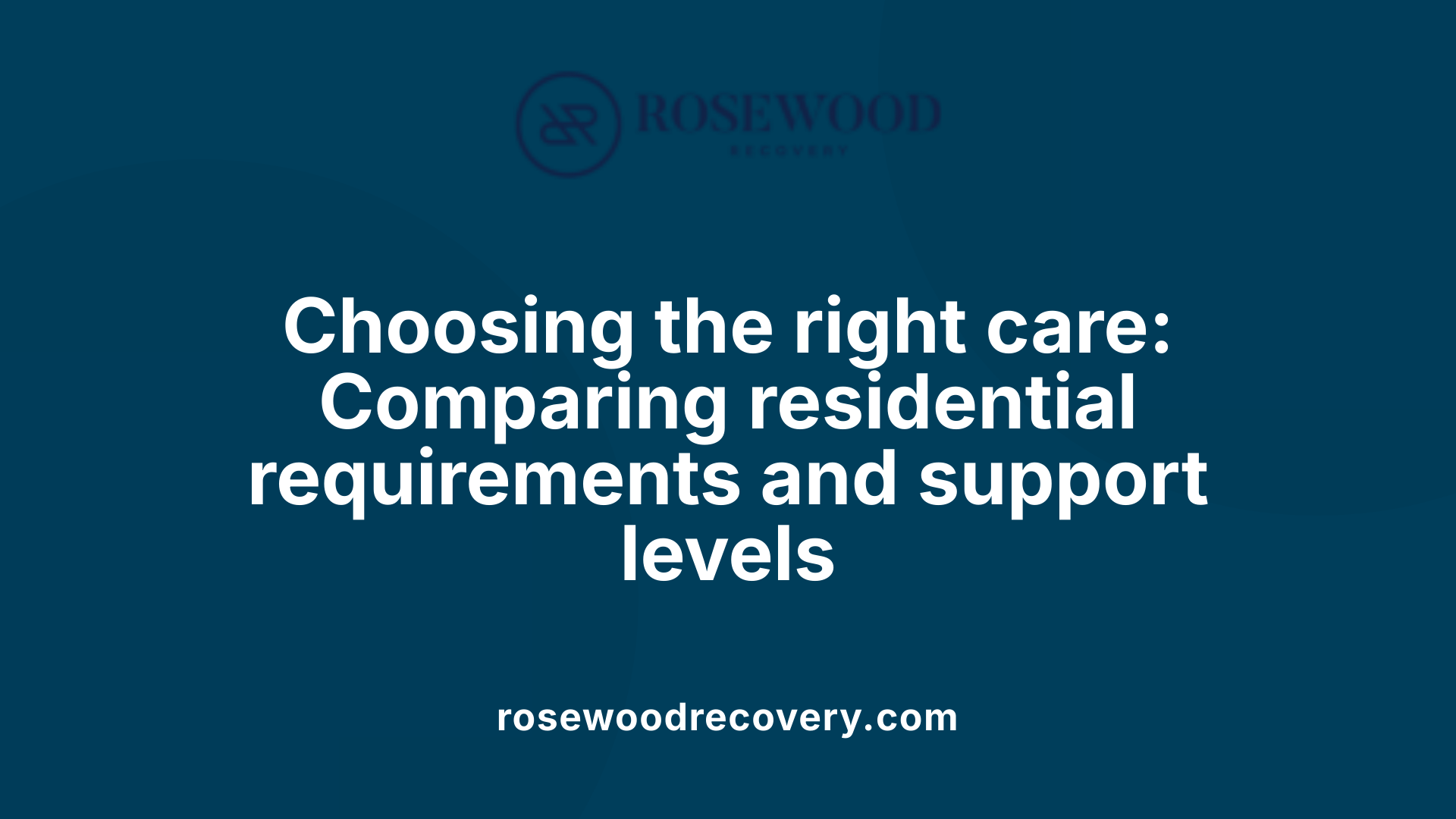
What is the difference between inpatient and outpatient care?
Inpatient and outpatient care differ mainly in the setting and level of support provided during treatment. Inpatient care requires patients to stay overnight or longer in a hospital or specialized medical facility. This type of care is suited for serious or complex conditions that need close medical supervision, such as severe substance dependencies, surgeries, or mental health crises.
Outpatient care, on the other hand, involves patients visiting the healthcare facility for treatment but not staying overnight. This form of care is designed for less severe issues or ongoing support post-inpatient treatment. Patients attend scheduled sessions, therapy, or medical procedures and then return home the same day.
Difference in residential requirements
The main physical difference between the two lies in residential requirements. In inpatient programs, individuals live within the treatment facility, which offers a structured environment with continuous medical and emotional support. Outpatient settings grant more freedom, allowing patients to live at home and manage daily responsibilities while attending scheduled treatment sessions.
Care intensity and support
Inpatient services typically involve comprehensive care plans including medical detox, therapy, medication management, and life skills training with 24/7 supervision. This intensive support aims to stabilize severe addiction or mental health conditions.
Outpatient programs can vary in intensity—from partial hospitalization, which may resemble inpatient therapy in schedule and support, to less intensive weekly therapy. These programs are ideal for those with milder conditions, strong support systems at home, or as follow-up care after inpatient treatment.
Cost differences
Cost is a significant factor in choosing between inpatient and outpatient care. Inpatient rehab can be costly, often exceeding $2,000 per week, and may total over $40,000 for a full treatment course. This high expense reflects the 24-hour care, accommodation, and comprehensive services.
Outpatient treatment is generally more affordable, often costing less than $1,000 per month. It eliminates room and board costs and allows patients to continue working or attending school, making it a more accessible option for many.
Suitable conditions for each
Inpatient care is most appropriate for individuals with severe substance use disorders, co-occurring mental health disorders, or those at risk of relapse due to environmental triggers.
Outpatient treatment suits less severe cases, individuals with some support at home, or those transitioning from inpatient care who need ongoing therapy and support while maintaining their daily routines.
Both approaches are valuable components of a comprehensive treatment plan, with the choice tailored to individual needs, severity of condition, and available support systems.
| Aspect | Inpatient Care | Outpatient Care | Details |
|---|---|---|---|
| Residential Requirement | Yes, live at facility | No, live at home | Inpatient provides full-time residential support; outpatient allows independence |
| Care Intensity | Highly intensive | Varies from moderate to low | Focuses on stabilization with 24/7 support; outpatient schedules vary |
| Cost | $2,000+ per week | Typically under $1,000 monthly | Inpatient's higher cost due to accommodations and round-the-clock care |
| Suitable Conditions | Severe addiction, co-occurring disorders | Mild to moderate conditions, support system at home | Choice depends on severity and environment |
Understanding these differences helps individuals and clinicians make informed choices for effective recovery pathways.
The spectrum of outpatient treatment options and their structures
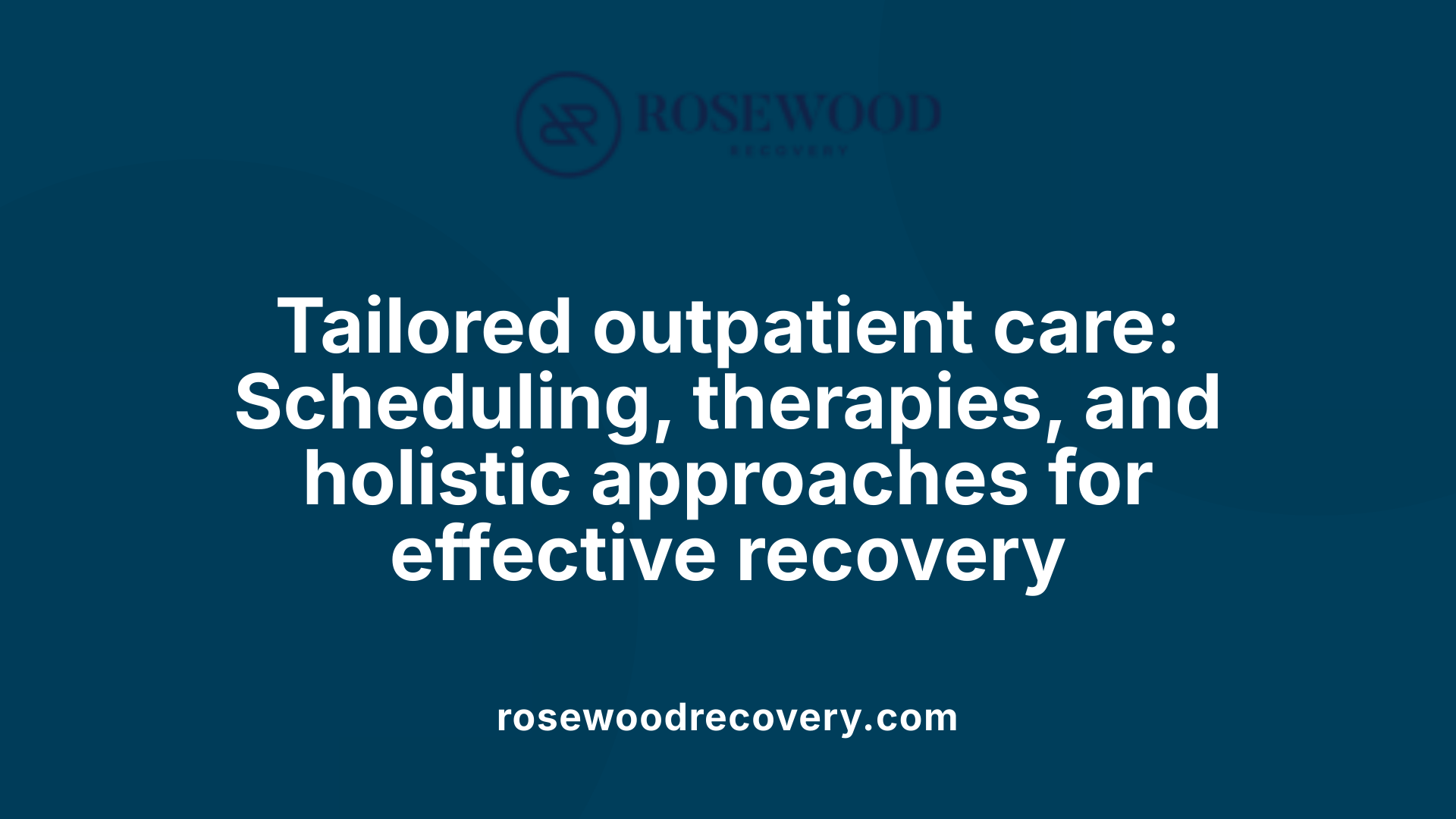 Outpatient substance abuse treatment offers a variety of program types designed to suit different needs and recovery stages. These programs range from standard outpatient services to more intensive structured interventions.
Outpatient substance abuse treatment offers a variety of program types designed to suit different needs and recovery stages. These programs range from standard outpatient services to more intensive structured interventions.
Varieties of outpatient programs include traditional outpatient therapy, Intensive Outpatient Programs (IOPs), and Partial Hospitalization Programs (PHPs). Standard outpatient therapy typically involves weekly counseling and group sessions, focusing on education, relapse prevention, and behavioral change. IOPs increase the frequency of sessions, often three to five times a week, with several hours per day dedicated to therapy, offering a middle ground between outpatient and inpatient care. PHPs are even more structured and intensive, usually requiring daily attendance, and are suitable for stabilization and initial recovery stages.
Levels of intensity and scheduling vary according to the individual’s condition. Outpatient programs can be scheduled during evenings or weekends, allowing participants to maintain employment and family responsibilities. Duration often ranges from several months to over a year, depending on progress and needs.
Medical supervision and medication management are integral components of outpatient treatment, especially in IOPs and PHPs. Medications such as methadone, buprenorphine, or naltrexone may be prescribed to assist with withdrawal management and reduce cravings, under the supervision of healthcare professionals.
Holistic and behavioral therapies complement medical treatments, addressing physical health, emotional well-being, and social functioning. Behavioral approaches like cognitive-behavioral therapy (CBT) and dialectical behavior therapy (DBT) help modify harmful thought patterns and behaviors. Many programs incorporate holistic therapies including yoga, meditation, acupuncture, and nutritional counseling, aiming to promote overall wellness.
These outpatient services are tailored to facilitate ongoing recovery, providing flexibility and personalized support. Effectiveness considerably depends on the individual’s motivation, support system, and ability to adhere to treatment plans. The integration of therapy, medication, and holistic care creates a comprehensive approach to tackling substance use disorders.
| Program Type | Typical Duration | Frequency of Sessions | Main Focus | Suitable For |
|---|---|---|---|---|
| Standard Outpatient | Varies, often months | Weekly or bi-weekly | Behavioral therapy, relapse prevention | Mild to moderate disorders |
| IOP | 3-5 days/week | Several hours daily | Stabilization, intensive behavioral therapy | Mild to moderate, post-inpatient |
| PHP | 5 days/week | Full-day sessions | Acute stabilization, medication management | Severe cases, co-occurring disorders |
Outpatient options continue to evolve with a focus on personalized, accessible, and comprehensive care, supporting individuals’ abilities to sustain recovery while maintaining their daily lives.
Efficacy of outpatient therapy: research insights and success metrics
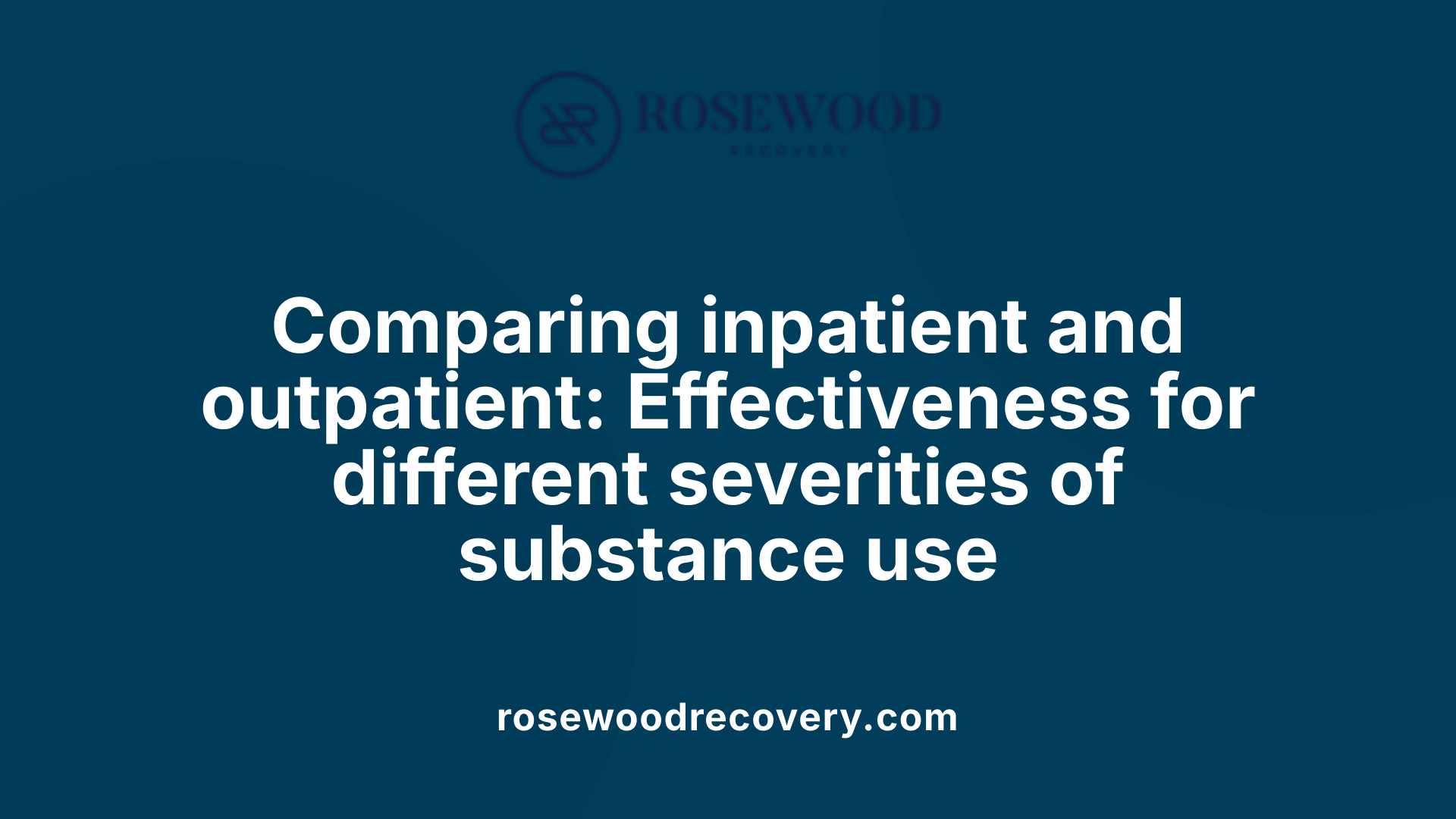
How effective is outpatient therapy for substance use disorders?
Outpatient therapy is recognized as a viable and effective treatment option, especially for individuals with mild to moderate substance use disorders. It allows patients to live at home and continue their daily routines, including work or school, which supports social stability and provides ongoing real-world practice of coping skills.
Research indicates that outpatient programs, especially Intensive Outpatient Programs (IOPs), lead to significant reductions in drug and alcohol use, with outcomes comparable to inpatient or residential treatments. Many studies report substantial improvements in abstinence rates, problem severity, and social functioning.
Effectiveness depends on key factors such as the severity of dependence, the motivation of the individual, the strength of their support network, and their commitment to attending sessions consistently. When these conditions are met, outpatient care can be just as successful in promoting long-term recovery.
Can outpatient programs be as effective as inpatient programs?
Yes, for suitable candidates, outpatient programs can match the effectiveness of inpatient care. Specifically, individuals with less severe addiction or those in stable living environments tend to benefit from outpatient treatment.
Outpatient services include various levels, such as Partial Hospitalization Programs (PHPs) and IOPs, which provide structured therapy sessions several times a week. These programs incorporate behavioral therapies like cognitive-behavioral therapy (CBT), medication management, family involvement, and holistic approaches.
While inpatient care offers intensive, 24/7 support suitable for severe addiction and co-occurring mental health conditions, outpatient programs excel in flexibility, affordability, and the ability to apply learned skills in everyday settings.
Many naturalistic studies and randomized trials underscore that, for appropriate patients, outpatient treatment results in similar reductions in substance use and problem severity.
Long-term effectiveness and relapse prevention
Long-term success in recovery often depends on sustained engagement in treatment and aftercare, regardless of setting. Outpatient programs emphasize ongoing therapy, participation in support groups like Alcoholics Anonymous, and lifestyle modifications that reinforce sobriety.
Studies show that continuity of care and extended treatment durations improve outcomes, whether outpatient or inpatient. Outpatient programs, with their focus on real-world application and community integration, are particularly suited for relapse prevention.
Maintaining motivation, building a support system, and utilizing holistic therapies such as meditation, nutritional counseling, and stress management contribute to sustained abstinence.
Criteria for success
Success in outpatient treatment hinges on several factors. These include the individual’s level of readiness, the availability of strong social and familial support, and the presence of co-occurring disorders that may require additional attention.
Regular attendance, adherence to therapy plans, and active participation in support activities are crucial. The motivation to change, coupled with structured relapse prevention strategies, significantly enhances the likelihood of enduring recovery.
In summary, outpatient therapy can provide comparable benefits to inpatient care for many individuals, especially when tailored to personal needs and delivered in an appropriately intensive manner. Continued research supports its role as a mainstay in the continuum of substance use disorder treatment, offering flexibility, affordability, and effective long-term outcomes.
Matching treatment intensity to patient needs: the role of clinical judgment
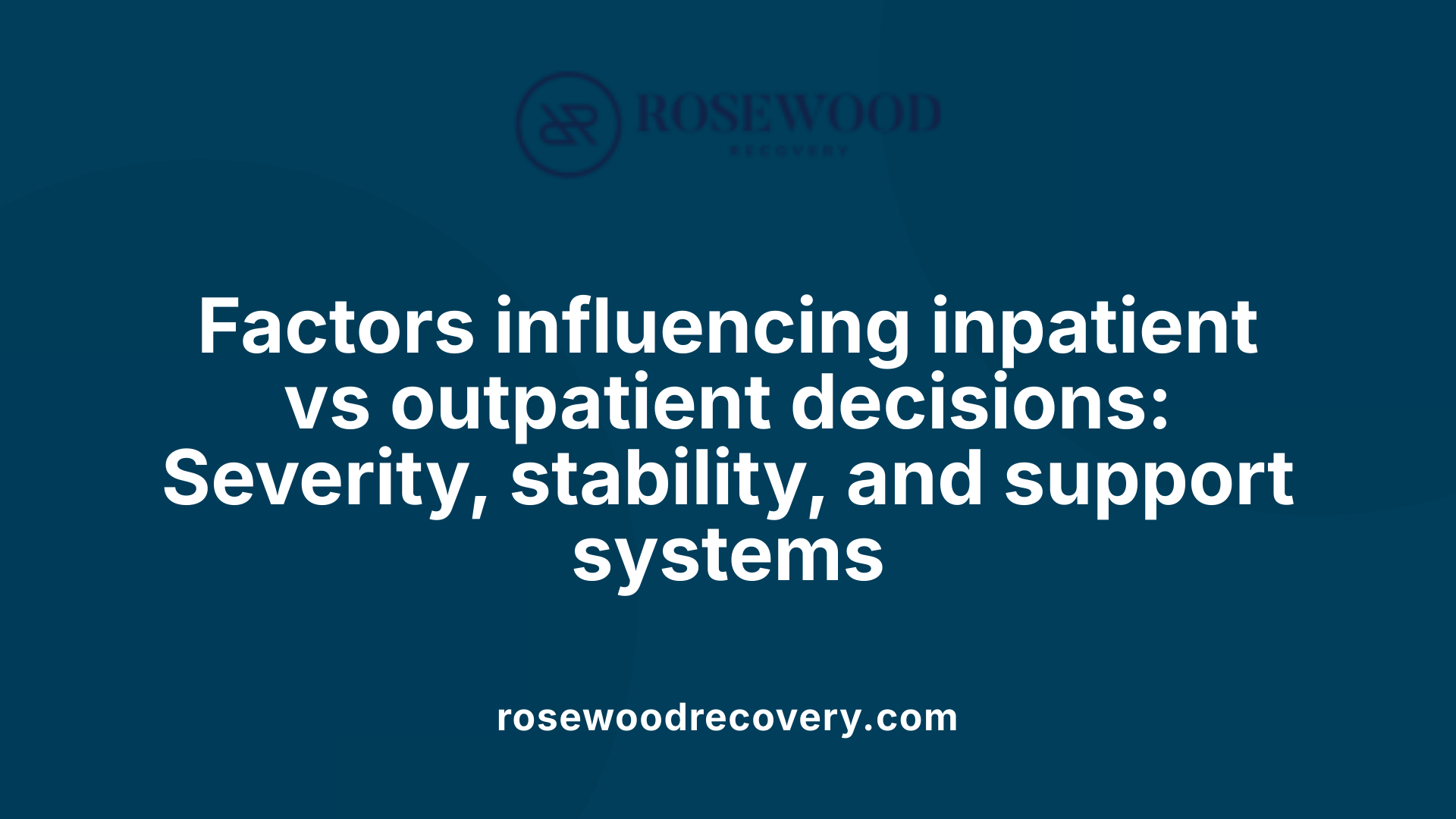
What factors influence the choice between inpatient and outpatient treatment?
Deciding between inpatient and outpatient treatment involves multiple considerations centered around the individual's specific circumstances and needs. One of the primary factors is the severity of the substance use disorder or co-occurring mental health conditions.
For severe cases, especially where there are risks of serious health complications or the need for intensive detoxification, inpatient care is often recommended. This setting provides round-the-clock medical supervision, which is crucial for managing withdrawal symptoms safely and effectively.
Support systems and stability at home also influence the decision. Patients with strong family support and a stable living environment are often better suited for outpatient treatment. Outpatient programs require motivation and a safe environment for the patient to adhere to their treatment plan.
Practical aspects such as cost, insurance coverage, availability of specialized facilities, and personal responsibilities significantly impact choice. Inpatient care tends to be more expensive, potentially exceeding $40,000 for a full course, and may not always be financially accessible or covered by insurance. Outpatient programs are usually more affordable and flexible, allowing individuals to maintain work, family, or school commitments.
The nature of the condition—whether primarily physical, mental, or substance-related—also guides treatment setting. Patients needing medical detoxification or those with complex mental health issues may require inpatient services. Conversely, individuals with mild to moderate issues, stable mental health, and good support systems often benefit from outpatient care.
Ultimately, clinical judgment is used to balance these factors. Healthcare providers assess the severity of the disorder, the patient's stability and environment, and the ability to participate actively in treatment. This comprehensive evaluation ensures that each person receives the level of care most likely to promote successful recovery and long-term sobriety.
Continuing care and the importance of support networks in outpatient recovery
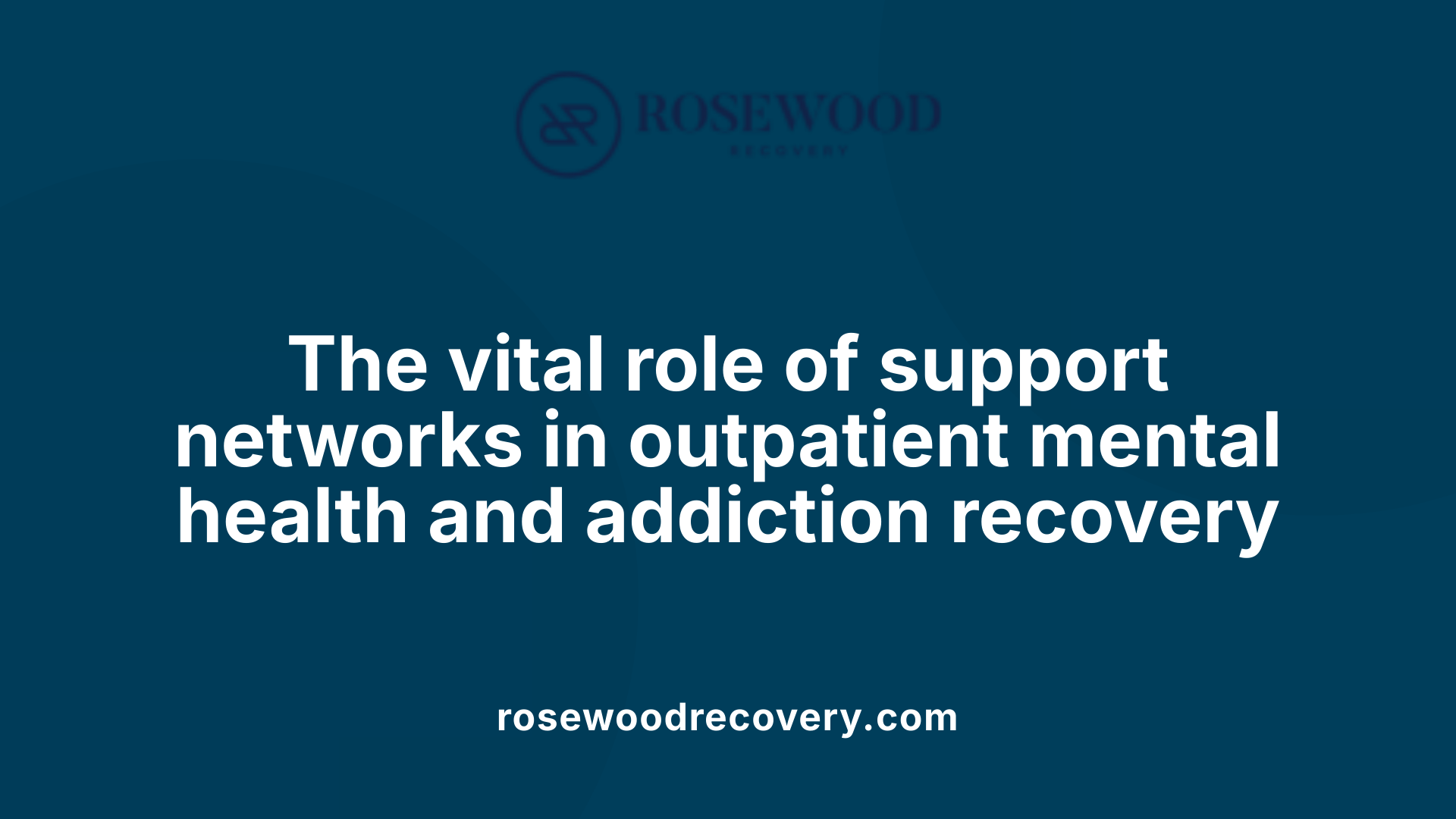
Are outpatient programs suitable for mental health treatment?
Yes, outpatient programs are generally suitable for many mental health conditions, especially those that are mild to moderate in severity. They offer flexible treatment options through therapies such as cognitive-behavioral therapy (CBT), dialectical behavior therapy (DBT), and group therapy, allowing individuals to continue their daily responsibilities while receiving care.
Outpatient programs are effective for conditions like depression, anxiety, bipolar disorder, trauma, and substance use disorders. They work best when individuals have a strong support system and live in a stable environment.
These programs include various formats like Intensive Outpatient Programs (IOP) and Partial Hospitalization Programs (PHP). The level of intensity and structure can be tailored to individual needs, making outpatient care accessible and personalized.
Overall, outpatient mental health programs provide a practical, cost-effective alternative to inpatient care. They enable patients to maintain their daily routines while benefiting from ongoing therapy, medical management, and community support—elements crucial for long-term recovery and stability.
Holistic and supplementary therapies that enhance outpatient care
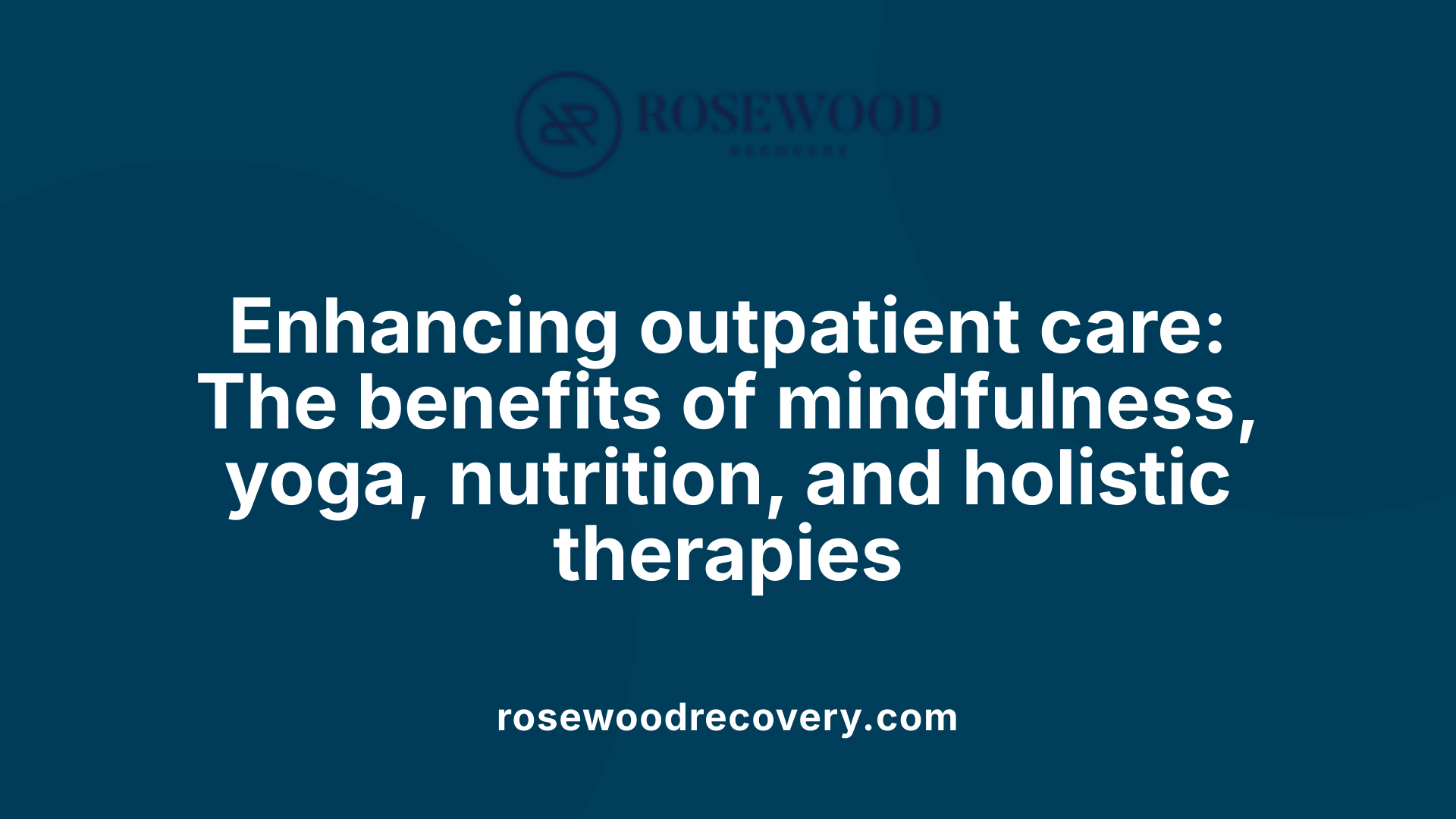
How do mindfulness, yoga, and nutrition complement outpatient treatment?
Outpatient programs often incorporate holistic therapies such as mindfulness, yoga, and nutrition to support recovery. These practices help improve mental clarity, reduce stress, and promote physical well-being, all vital for sustaining sobriety.
Mindfulness and meditation techniques encourage patients to stay present and manage cravings more effectively. Yoga offers physical activity that can enhance mood and decrease anxiety, while nutrition counseling ensures individuals support their bodies with healthy eating habits. Together, these approaches help address not only substance use but also overall mental and physical health.
What role do complementary therapies play in outpatient recovery?
Complementary therapies like acupuncture, art therapy, and massage are commonly integrated into outpatient treatment plans. They provide additional avenues for emotional expression and relaxation, reducing tension and helping to manage co-occurring mental health issues such as depression or anxiety.
Studies suggest that these therapies can improve treatment adherence and boost long-term recovery by fostering a sense of well-being and resilience.
How can mental and physical health be integrated in outpatient services?
Effective outpatient care recognizes the intertwined nature of mental and physical health. Programs often coordinate behavioral therapies with medical management to treat underlying mental health conditions alongside substance use disorder.
This integrated approach ensures personalized care, addressing diverse needs and promoting sustained recovery, making outpatient treatments as effective as inpatient options when properly tailored.
| Practice | Focus Area | Benefits | Additional Details |
|---|---|---|---|
| Mindfulness | Mental health | Reduced cravings, increased self-awareness | Utilizes meditation and breathing exercises |
| Yoga | Physical health | Stress relief, mood regulation | Includes postures and breathing techniques |
| Nutrition | Physical health | Better energy, improved mood | Focuses on balanced diet to support recovery |
| Acupuncture | Complementary therapy | Stress reduction, pain relief | Often used to alleviate withdrawal symptoms |
| Art Therapy | Emotional expression | Better emotional regulation, self-discovery | Uses creative arts to process feelings |
This integrated, holistic approach enhances outpatient programs, supporting individuals to rebuild health and resilience in their everyday environment.
A Personalized, Effective, and Accessible Approach to Recovery
The evidence underscores that outpatient treatment, when appropriately structured and supported, can be as effective as inpatient care for many individuals struggling with mental health and substance use disorders. Key factors include patient motivation, support systems, and the intensity of the program. Both forms of treatment play crucial roles in the continuum of care, often complementing each other across different recovery stages. Ultimately, a personalized approach that considers individual needs, severity, and resources affords the best opportunity for sustained long-term recovery. Outpatient programs, with their flexibility, affordability, and holistic options, are increasingly recognized as vital components in modern mental health and addiction care, making recovery more accessible and achievable for diverse populations.
References
- Summary of Evidence - Inpatient and Outpatient Treatment ... - NCBI
- Inpatient Vs. Outpatient Rehab - Addiction Center
- Substance Abuse Intensive Outpatient Programs: Assessing the ...
- Inpatient vs. Outpatient Rehab: What's Right For You? - Healthline
- Inpatient vs. Outpatient Treatment: Which is Right For You?
- Outpatient vs. Inpatient Care | Touchstone Recovery
- Inpatient vs. Outpatient: Drug, Alcohol and Mental Health Rehab
- Eight Benefits of Outpatient Mental Health Programs
- The Benefits of Outpatient vs. Inpatient Treatment for Addiction in ...
- Choosing the Right Alcohol Rehab: Inpatient vs. Outpatient Treatment



.jpeg)
